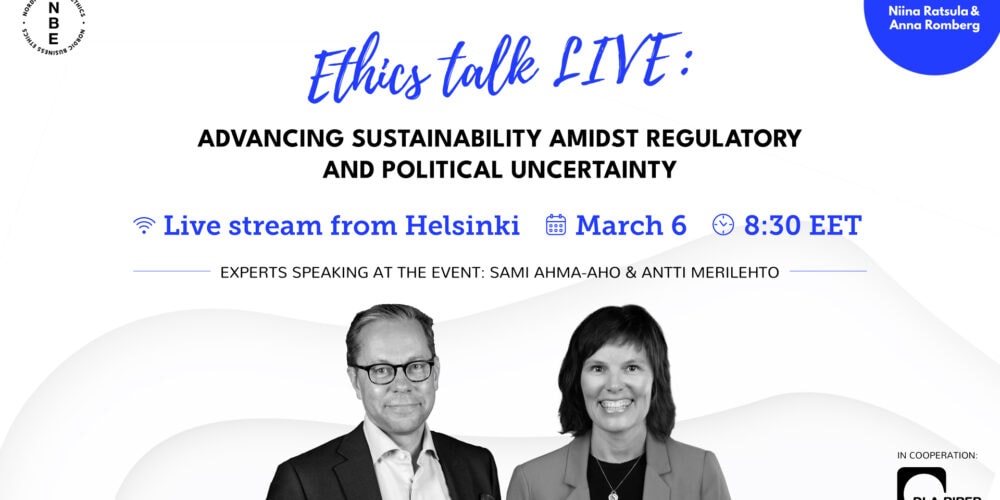5 Takeaways to foster Ethics & Compliance in A Time of Crisis
Nordic Business Ethics Network co-hosted a webinar together with Hannes Snellman’s compliance expert Maria Wasastjerna on April 22 around the topic “Compliance & Ethical Business Conduct in A Time of Crisis”. Thank you for all the participants who joined the webinar live. For the rest of you we are happy to share the webinar recording for a later review.
In this blog we have gathered the highlights of the webinar discussion. At the end of the article you can find the results of the webinar polls – we asked the participants how corona has effected the ethics and compliance efforts in their organizations.
Here’s our 5 key takeaways for the businesses to foster compliance and ethical business conduct in and after crisis:
1. Corona is not an excuse for non-compliance
Several authorities have issued statements about relaxing certain obligations and requirements for businesses (e.g. tax authorities and competition authorities in certain countries). However, when it comes to corporate compliance, there will be continued strict enforcement. Regulators are clear that compliance remains as important as ever.
2. Compliance is about enabling business
Finland’s National Emergency Supply Agency (Huoltovarmuuskeskus) is a sad example of a very recent compliance failure. Shorty, it failed to apply basic due diligence in protective equipment purchases and the related procurement processes.
The purpose of compliance is to secure that the business does not get lost. And compliance should be more present that ever in a time of crisis. Pressure is not an excuse to make ethical compromises. The challenge is that pressure is a typical source for ethical blindness. Thus, we should be now paying careful attention to those parts of the business where time or resource pressure could jeopardize the compliance.
3. Adjust your risk assessment
It is most important to consider and identify the risks that are most critical to the business today, not what they were a couple of months ago. Take an honest look at your current situation and re-evaluate. The prioritisations will come from your business model and current situation. You can start for example with these questions:
- Are you in production, and the supply chain is frozen? There are probably plenty of new small ad-hoc suppliers offering to provide the missing pieces for your supply chain. Before rushing to sign the deal, consider the vetting process. You might not have time to run the ad-hoc suppliers through your ordinary sourcing process. However, you can not make the risks go away: You still need to manage the conflict of interest, corruption and money laundering risk.
- Do you have a large sales distribution network? Are the sales targets for your resellers (and own sales force) the same? Have those been adjusted to the current market scenario? Keeping the sales quotas in an unrealistic level might lead into unethical practices as the pressure grows.
- If you are in professional services, how do you manage data privacy and confidentiality risk? Are your employees working from home offices with sensitive information, do they share same office space as their spouse? Ensure you have guidance on how to manage confidential information, video meetings etc.
4. Impact the behaviors
This crisis will surely have an impact on people behaviours. The risk for fraud and corruption increases during crisis due to increased feeling of pressure, fear, even desperation. To be successful in compliance, we need to be more honest than ever to really ask our organizations, teams and leaders: what could potentially create pressure for us? What kind of behavioural risk do we have? While we look at our sales targets, production, supply chain management, data management as described above…
We’re all now living in the biggest compliance experiment of all time, the way this whole situation goes depends on how we all behave. And that means that the health care officials are in the same position as compliance officers the world over—except on the biggest possible scale.
No matter how difficult compliance challenges you might think your company has, nothing is ever going to be as difficult as trying to get practically the whole world to stop moving and staying at home, for weeks, or for months.
So, how has the health care crisis management dealt with this compliance challenge? They have used very simple, action-oriented communications, targeted to change people behaviour. And in most cases, it works! So, this a good reminder for all of us: How much of our compliance work is really focusing on aiming to change people behaviour (instead of entertaining, educating, or creating records of how may persons we have educated)? It’s the conduct that matters.
5. Stay close to business as this is the time for unexpected suprises
This is the time to be absolutely honest to ourselves and ask: are there some areas of business where we are having increased risk for ethical or compliance failures? When we look at the sales, procurement, recruitment or any business objectives, what are the factors causing potential pressure? Is there a risk of getting too busy, tired or stressed to see our ethical dilemmas? Look at the below picture and draw the perfect storm for your company.
This is the time to be absolutely honest to ourselves and ask: are there some areas of business where we are having increased risk for ethical or compliance failures? When we look at the sales, procurement, recruitment or any business objectives, what are the factors causing potential pressure? Is there a risk of getting too busy, tired or stressed to see our ethical dilemmas? Look at the below picture and draw the perfect storm for your company.
To find the answer, you need to be “out there” virtually with the business leaders. Make yourself available, ask how people are doing and invite colleagues for virtual coffees.
*
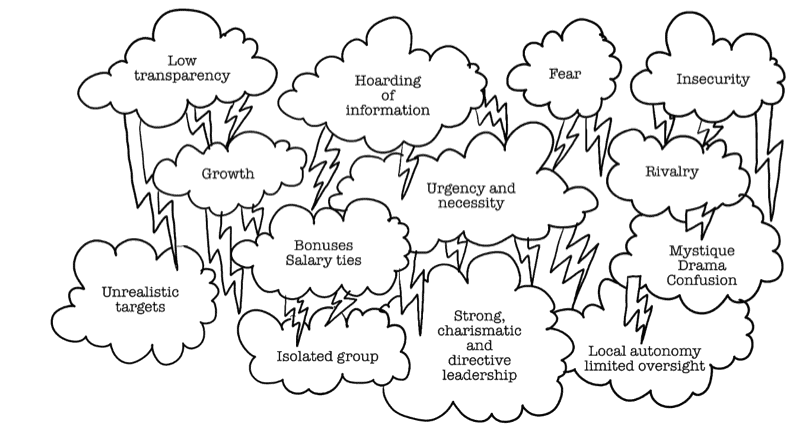
How is corona impacting the compliance team efforts?
We asked the webinar participants how corona has affected compliance trainings and investigations.
Based on the results, most of the organizations had either transferred the planned face to face trainings into online mode, or had their trainings digitalized already before. Also, the investigations were transferred online by many. Only 7% of the investigations and 6% of trainings were cancelled/postponed due to corona. This is a good sign, as the compliance efforts are needed now more than ever.
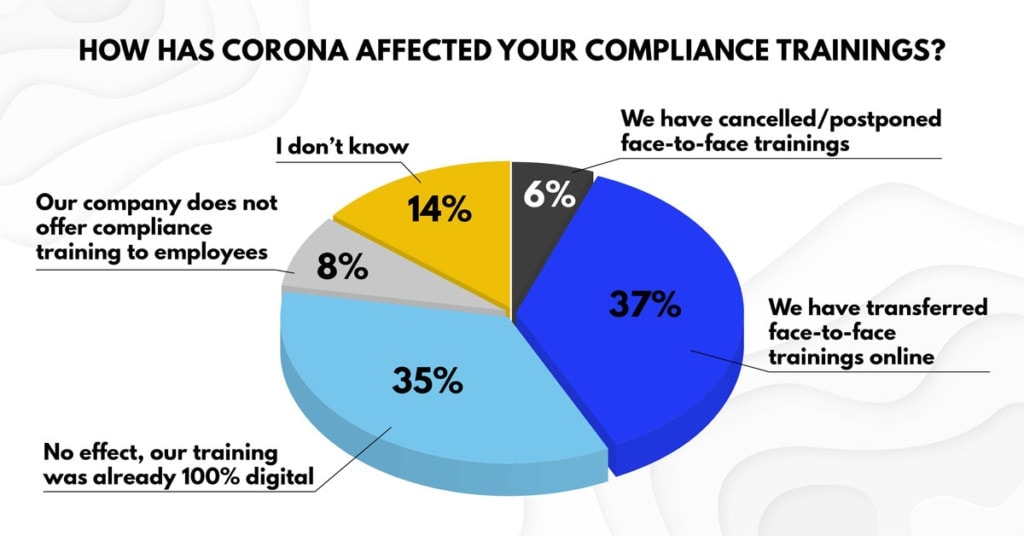
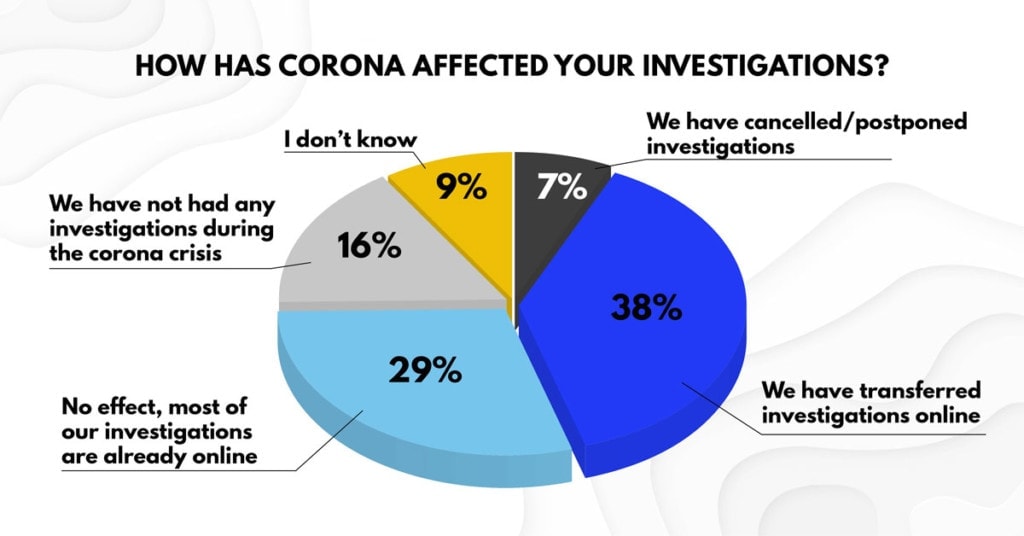
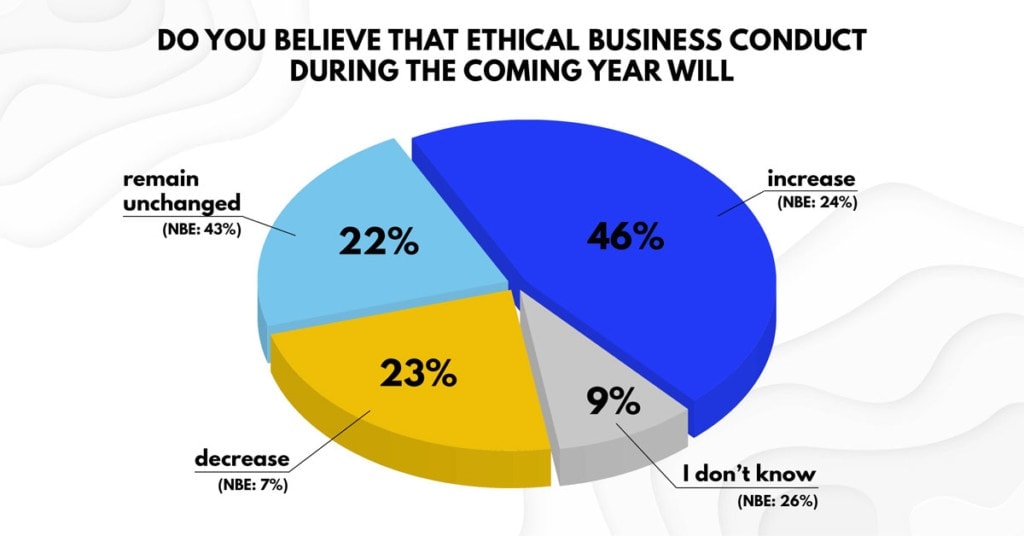
Niina & Anna

